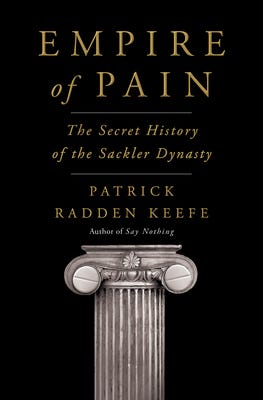It’s no secret how much influence Big Pharma has not only on the United States but across the globe. What is a secret, though, is how shady that influence really is, how insidious in nature, how corrupt.
Those of you who’ve been here for a bit know I’m a huge supporter of the terrain theory of disease. Largely, my support comes from innate knowledge combined with trial and error about the importance of lifestyle on health, a healthy disdain of modern medicine and health care brought on by more than a decade in health insurance, and concern about the incestuous relationship between Big Pharma and Big Government.
Because like it or not, congressional leadership in the United States is not just heavily influenced by the goings on of Corporate America; it feeds corporate America and is fed by corporate America in return. Big Gov and Big Pharma cannot exist independently.
If you’re triggered by talks of the oligarchy, let me remind you that folks are now watching stock trades by Nancy Pelosi and others, who are practicing insider trading despite their impassioned denials that insider trading is occurring.
During the plandemic, at least 75 lawmakers invested — heavily, I might add — in Big Pharma to their great benefit. Following the money means coming to terms with the fact that, red or blue, Big Government doesn’t care about the American people.
While Empire of Pain is not about the COVID days, it should be required reading for anyone who thinks Big Pharma and Big Government actually have the public interest at heart.
Modern Americans are suffering from cognitive dissonance and rampant addiction, something discussed, albeit in different words, in Keefe’s book. We have cognitive dissonance because the way we experience life varies wildly from how the news, our parents, and our teachers taught us that we should experience it. We are feeling the effects of decades of lies. And because of this cognitive dissonance, we look for remedies to soothe our aching souls.
Empire of Pain provides a necessary backdrop for assessing how exactly Americans were ideologically captured by Big Pharma, so that we can prevent such capture in the future.
Because here’s the thing: If wellness comes from a pill bottle, it isn’t wellness at all.
Here are selected quotes from Empire of Pain that spoke to me on a fundamental level:
The term “broad-spectrum” sounds clinical, but the truth is, it was coined by advertisers: it first entered the medical literature with Arthur [Sackler]’s campaign for Terramycin.
“The doctor is feted and courted by drug companies with the ardor of a spring love affair,” one commentator observed. “The [pharmaceutical] industry covets his soul and his prescription pad because he is in a unique economic position; he tells the consumer what to buy.”
You might think that the [medical and science] journals would have an interest in vetting the advertisements that people like Arthur Sackler and Bill Frohlich placed, but many of these publications were heavily dependent on advertising revenue.
[T]he truth was, Librium and Valium were marketed using such a variety of gendered mid-century tropes—the neurotic singleton, the frazzled housewife, the joyless career woman, the menopausal shrew—that as the historian Andrea Tone noted in her book The Age of Anxiety, what Roche’s tranquilizers really seemed to offer was a quick fix for the problem of “being female.”
On the connection between female “illness” (aka: pathologizing womanhood) and Big Medicine, see Enter: Madness.
The drug industry “misleads” physicians, Moulton concluded. The notion that the FDA actually protects American consumers was nothing but a comforting myth.
Physicians often scoff at the suggestion that their prescribing habits might be swayed by the blandishments of pharmaceutical companies. This has been a cornerstone of Arthur Sackler’s worldview: the notion that doctors are priest-like figures, immune to flattery or temptation or greed, focused exclusively on the narrow dictates of appropriates medical care. In Arthur’s view, it was laughable—even insulting—to insinuate that a colorful ad or a steak dinner might be enough to sway the clinical judgment of an MD. Doctors, he argued, simply can’t be bought.
But, of course, this is no more true today than it was when Arthur Sackler said it. Doctors are human, and the notion that donning a white coat might somehow shield them from temptation is fantasy. A 2016 study found that purchasing even a single meal with a value of $20 for a physician can be enough to change the way that he prescribes.
African Americans had been spared the full brunt of the opioid epidemic: doctors were less likely to prescribe opioid painkillers to Black patients, either because they did not trust them to take the drugs responsibly or because they were less likely to feel empathy for these patients and want to treat their pain aggressively. As a result, levels of addiction and death were statistically low among African Americans. It appeared to be a rare instance in which systemic racism could be said to have protected the community. But people of color were disproportionately affected by the war on drugs. Purdue executives might have evaded jail time for their role in a scheme that generated billions of dollars for Madeleine’s family, but in 2016, Indiana’s governor, Mike Pence, signed a law reinstating a mandatory minimum sentence for any street-level dealer who was caught selling heroin and had a prior conviction: ten years. Nationwide, 82 percent of those charged with heroin trafficking were Black or Latino.
For [David Sackler] to point to the fact that the FDA signed off on Purdue’s decisions was to overlook the degree to which the FDA had been compromised by Big Pharma in general and Purdue Pharma in particular.
At the very end of the book, Keefe came back around to the Sackler brothers’ original vision for Purdue and the family history wrapped therein. He writes:
Nearly a century earlier, during the height of the Depression, Isaac Sackler told his three sons that if you lose a fortune, you can always earn another, but if you lose your good name, you can never recover it. Sounding very much like Isaac Sackler, [attorney] Maura Healy concluded, “They can’t buy their reputations back.” [. . .] In 1947, when Richard Sackler was still a toddler, his father and his uncles incorporated one of their first family foundations “in memory of Isaac Sackler as a tribute by his sons to a man whose love knew no ends and whose interests and vision were limitless.” Their aim was to “advance the ideals he cherished,” the brothers wrote, and “to help alleviate man’s suffering.”
What could have been an amazing and transformative family legacy for three wily businessmen and brothers became a sordid quest for clout and cash at the expense of the very people being sold a dream.
Big Pharma spends a lot of time developing lucrative drugs and then convincing people they need those drugs to survive. The uncomfortable truth is that some of the drugs in your medicine cabinet are likely harming you, though you believe you need them because Big Pharma told you you needed them. They also told your doctor you needed them. But when Americans are being treated for cancer caused by cancer treatments . . . well, we can guess at whether we actually need Big Pharma, or whether Big Pharma needs willing, captured consumers who believe they are victims of life.
A note of caution: While Empire of Pain centers on the Sackler family and Purdue Pharma, every single drug manufacturer in the United States today has had a multi-million or multi-billion-dollar lawsuit brought against them for faulty product. Here are 10 of the largest pharmaceutical lawsuits in history.
When you read Empire of Pain, you may never want to put a pharmaceutical product in your body again.
And you will likely be healthier for it.
<3 Fal






"Because here’s the thing: If wellness comes from a pill bottle, it isn’t wellness at all." What a simple but inciteful line. Definitely going to save this as something to remind myself from time to time, and to share with others.